Blockchain technology, initially popularized by its use in cryptocurrency, is now making significant inroads into the healthcare industry. This decentralized and distributed ledger technology offers a new paradigm for how information is shared, verified, and secured across multiple stakeholders in healthcare. Its key features, such as immutability, transparency, and security, present promising solutions to many longstanding challenges in healthcare, including data fragmentation, security concerns, and inefficiencies in supply chains.
We all know that security and transparency is the major factor while dealing with any industry. In healthcare industry they are the backbone.
In 2019, a major breach at AMCA exposed the personal data of 5 million people from clients like Quest Diagnostics and LabCorp. This incident, known as “data malpractice,” didn’t benefit patients and raised concerns about data security in healthcare.
Blockchain technology can address these issues by securely encrypting and distributing data across a network, making it nearly impossible to hack. It also allows patients to control who accesses their information, ensuring it’s used to improve healthcare outcomes and reduce costs. Therefore, blockchain is crucial for enhancing data security and transparency in the healthcare industry.
- What is Blockchain in Healthcare?
- Top 25 Blockchain in Helathcare Market Statistics and Trends in 2025-30
- How is Blockchain Used in Healthcare?
- Will Blockchain Save the Healthcare System?
- Disadvantages of Using Blockchain in Healthcare Industry
- Top 10 Examples of Blockchain in Healthcare Industry
- What is the Future of Blockchain in Healthcare?
- Final Thoughts
What is Blockchain in Healthcare?
Blockchain in healthcare refers to the innovative application of blockchain technology to enhance various aspects of healthcare services. This technology, best known for underpinning cryptocurrencies like Bitcoin, offers a secure, decentralized platform for recording and sharing data. In the healthcare sector, blockchain is transforming the way patient records are managed, ensuring data integrity, enhancing the security of sensitive information, and facilitating seamless sharing of patient data among authorized professionals.
By enabling a tamper-proof, transparent, and efficient system for managing health records, blockchain technology significantly reduces the risk of data breaches, improves patient outcomes by ensuring the accuracy and availability of medical records, and streamlines administrative processes.
Additionally, blockchain supports health data analytics and personalized medicine by providing a reliable source of patient data for research, ultimately leading to better healthcare delivery and innovation.
If you are an aspiring entreprenur and want to build your dream healthcare project then you may reach out to our handpicked Premier Healthcare Software Development Companies.
Before digging into the role of blockchain in the healthcare industry let’s take a look at the top 25 market statistics of Blockchain in Healthcare.
Top 25 Blockchain in Helathcare Market Statistics and Trends in 2025-30
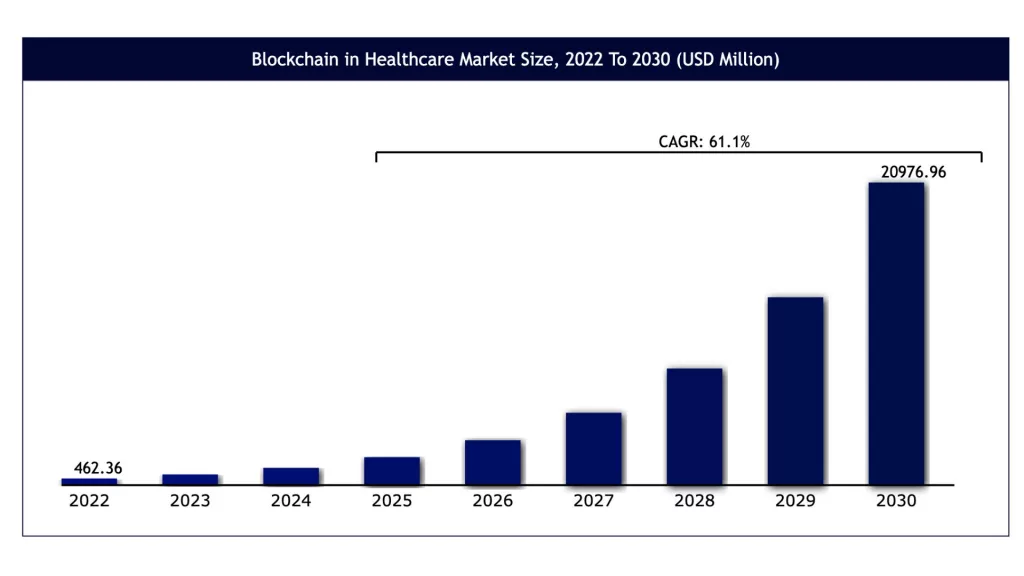
- In the year 2023, the industry size of blockchain technology in healthcare was around USD 2.37 Billion.
- Blockchain Technology in Healthcare Market size is estimated to cross USD 215 Billion by the end of 2036, growing at a CAGR of 35% during the forecast period, i.e., 2025 – 2036.
- The industry is expected to benefit from growing investments in efficient medical examination systems, wearable device cryptography, and healthcare record systems.
- The global wearable technology market size was valued at USD 32.63 billion in 2019.
- As per the National Library of Medicine, now various blockchain platforms are being explored. They are Ethereum, IOTA, and permissioned blockchains, indicating the diversity in technological approaches to healthcare solutions.
- The healthcare sector creates a global data volume of about 30%. The CAGR of healthcare data will be 36% by 2025. This is 6% quicker than the industrial sector, 10% quicker than the financial sector, and 11% quicker than the media & entertainment sector.
- Based on its various applications in healthcare, the healthcare blockchain market is segmented into clinical data interoperability & identity management, supply chain management, health insurance & fraud prevention, and other applications.
- In 2022, when looking at how blockchain technology was used, the area of supply chain management stood out. It made up more than a quarter of the total money made from blockchain, hitting over 26%.
- Also, if we talk about who’s really using this technology, biopharmaceutical and medical device companies were the biggest users. They represented around 41% of the total earnings from blockchain technology in the year 2022. This shows how important blockchain has become in managing supply chains and in the healthcare industry, especially for companies making medicines and medical devices.
- The rise in fake drugs and strict laws like the Drug Quality and Security Act in the US and the Falsified Medicines Directive in Europe are pushing the use of blockchain in managing healthcare supply chains. This technology helps ensure that medicines are genuine and meet safety standards.
- Blockchain technology also facilitates the transition from institution-driven interoperability to patient-centered interoperability, allowing patients to assign access rules for their medical data, according to a 2019 Healthcare Informatics Research study.
- The COVID-19 pandemic accelerated the adoption of blockchain technology in healthcare.
- PwC reports that 61% of businesses are making digital transformation their top priority for growth. Blockchain technology is playing a key role in this shift by offering improved security and transparency for companies.
- Healthcare data breaches have significantly increased over the last five years, affecting as many as 80 million people.
- The growing demand for digital payment systems and the rising demand for smart contracts are key healthcare industry trends.
- Blockchain offers a potential solution to safeguard patient and clinical data against an aging population and rising healthcare costs.
- The concentrated market allows enterprises to take advantage of specialized blockchain healthcare offerings from vendors like IBM and Microsoft.
- The use of blockchain for clinical trials & eConsent is anticipated to grow notably, driven by the need for secure and efficient data management.
- The private blockchain segment is predicted to witness the fastest growth rate, offering enhanced privacy, security, and transaction speed for healthcare applications.
- The adoption of blockchain technology within hospitals is expected to grow substantially, aiding in the secure storage and access of patient data.
- Europe is expected to maintain a leading position in the global market, supported by strict data protection regulations like GDPR.
- The growth of the blockchain in the healthcare market may be hindered by a lack of awareness and understanding of blockchain technology among healthcare providers.
- Leading healthcare organizations, including Quest Diagnostics, Humana, and Optum, have formed the Synaptic Health Alliance to explore blockchain’s potential in improving data exchange and reducing costs in healthcare.
- Blockchain applications in healthcare could save the industry up to $100-$150 billion per year by 2025 in data breach-related costs, IT costs, operations costs, support function costs, and personnel costs, through fraud prevention and reduction, IT costs, and personnel costs.
- Approximately 55% of healthcare applications will have adopted blockchain for commercial deployment by 2025, emphasizing its role in patient data management and security.
How is Blockchain Used in Healthcare?
Blockchain technology is being leveraged in several key areas within the healthcare industry to enhance efficiency, security, and transparency. Here’s an in-depth look at its major applications:
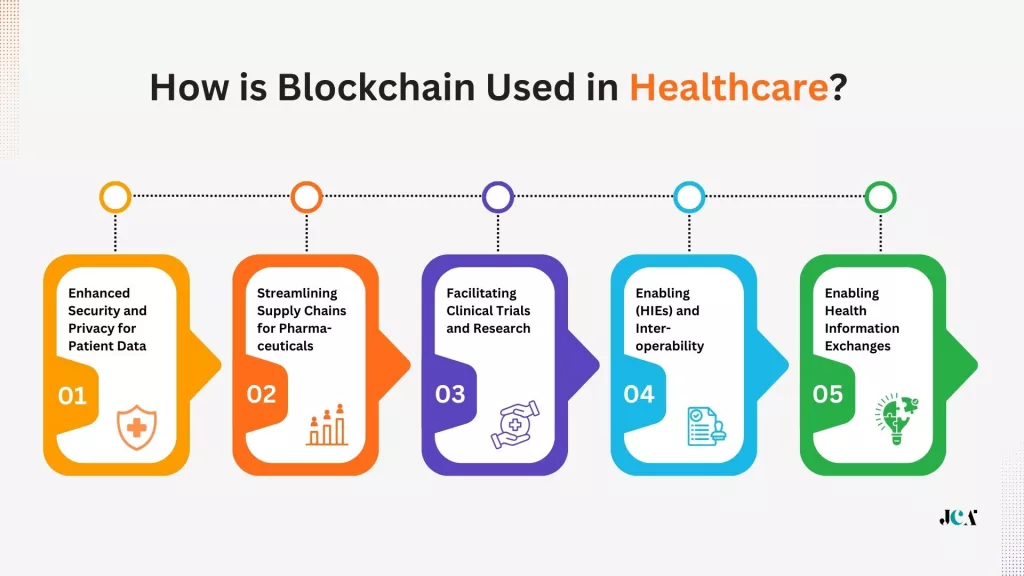
1. Enhanced Security and Privacy for Patient Data
Blockchain technology offers a robust solution to the healthcare industry’s perennial challenge of data security and privacy. By enabling the creation of a decentralized and immutable ledger for storing patient records, blockchain ensures that medical data is secure, tamper-proof, and accessible only by authorized parties.
This not only helps in protecting sensitive information from cyber threats but also empowers patients by giving them control over who accesses their data.
The use of blockchain for managing Electronic Health Records (EHRs) can streamline the sharing of medical information among healthcare providers, ensuring accurate and timely access to patient data while maintaining compliance with privacy regulations.
You might be interested in reading How do healthcare apps make money?
2. Streamlining Supply Chains for Pharmaceuticals
The pharmaceutical supply chain is complex, involving multiple stakeholders, including manufacturers, distributors, pharmacies, and patients. Blockchain technology can introduce transparency and traceability in this supply chain, allowing for the verification of the authenticity of drugs, tracking their journey from production to delivery, and preventing counterfeit medications from entering the market.
By recording each transaction on a blockchain, stakeholders can ensure the integrity of the supply chain and quickly identify and address any discrepancies, thereby improving patient safety and trust in healthcare products.
3. Facilitating Clinical Trials and Research
Blockchain can revolutionize clinical trials and medical research by providing a secure platform for storing and sharing data. It enables the immutable recording of consent forms, research findings, and patient data, ensuring the integrity of research data.
This transparency can enhance trust among participants, regulatory bodies, and researchers, making it easier to monitor trial progress, verify results, and ensure compliance with ethical standards. Additionally, blockchain can facilitate patient recruitment and retention by providing a transparent and secure method for participants to control and share their data with researchers.
4. Enabling Health Information Exchanges (HIEs) and Interoperability
Interoperability between various healthcare systems and providers is crucial for the seamless exchange of patient information. Blockchain technology can serve as the foundation for Health Information Exchanges (HIEs), enabling disparate systems to securely share medical records and other health data.
This can significantly reduce the duplication of diagnostic procedures, minimize errors, and ensure that healthcare providers have timely access to vital patient information, leading to better patient outcomes.
Blockchain’s decentralized nature allows for a patient-centered approach, where individuals have the ultimate control over their health data, deciding who can access it and for what purpose.
Also have a look at: AI in Healthcare: Revolution or Evolution?
Will Blockchain Save the Healthcare System?
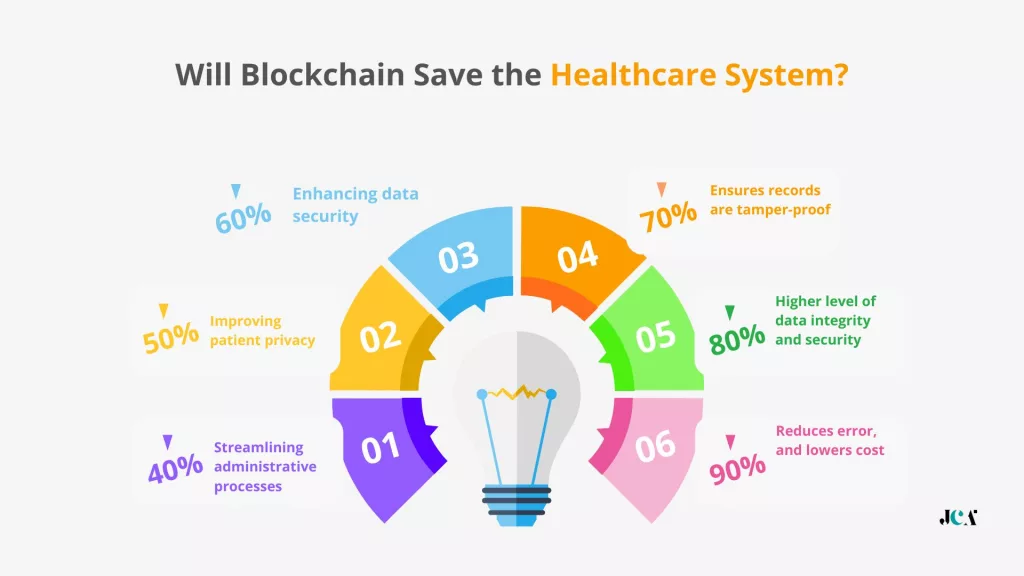
Yes! Blockchain is the solution for most of the global healthcare problems related to security, transparency and much more.
Blockchain technology is revolutionizing the healthcare system by enhancing data security, improving patient privacy, and streamlining administrative processes.
It provides a decentralized and immutable ledger that can secure medical records.
Blockchain also ensures records are tamper-proof and accessible only to authorized individuals.
This technology facilitates a higher level of data integrity and security, addressing current concerns about data breaches and unauthorized access.
Additionally, blockchain can streamline administrative tasks by automating patient billing and claims processing, reducing errors, and lowering costs. Its application in managing supply chains also ensures the authenticity of pharmaceuticals, combating counterfeit drugs.
While blockchain presents a solution to many challenges in healthcare, its successful integration depends on overcoming regulatory, technical, and adoption barriers. The technology’s potential to save the healthcare system lies in its ability to foster trust, transparency, and efficiency in managing health information.
Also read: How can mobile health apps improve the healthcare industry?
Disadvantages of Using Blockchain in Healthcare Industry
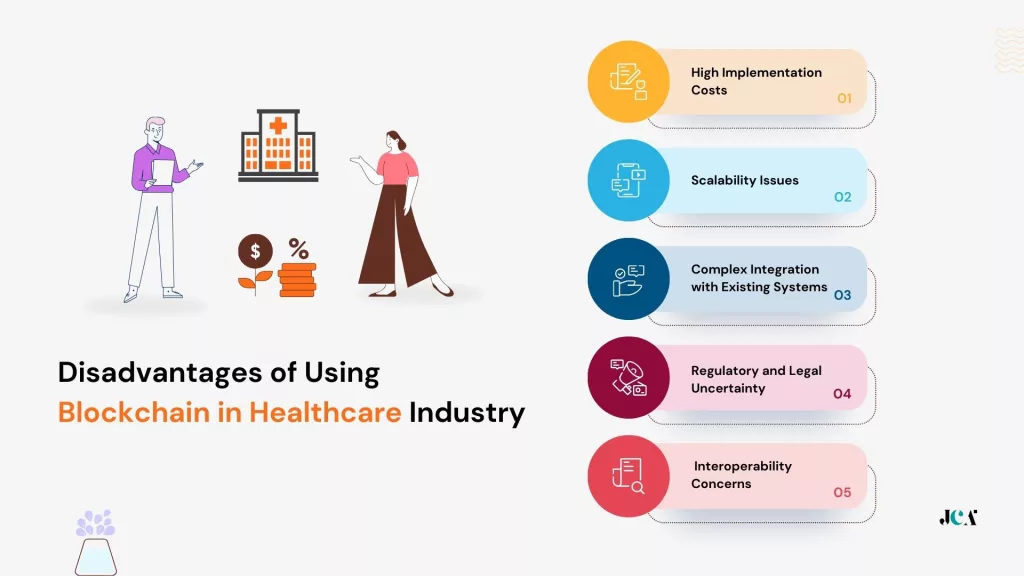
Below I have listed few disadvantages of using blockchain in Healthcare industry.
1. High Implementation Costs
Implementing blockchain technology requires significant upfront investment in infrastructure, software, and training. For many healthcare organizations, particularly smaller ones, the cost of adoption can be prohibitively high, limiting widespread implementation.
2. Scalability Issues
Blockchain technology, especially in its current form, struggles with scalability. The more transactions added to the blockchain, the larger the database grows, which can lead to slower transaction times and increased resource consumption, making it less efficient for large-scale healthcare applications.
3. Complex Integration with Existing Systems
Integrating blockchain technology with existing healthcare information systems can be complex and challenging. This integration often requires substantial modifications to existing systems, which can be time-consuming and disruptive to healthcare operations.
4. Regulatory and Legal Uncertainty
The regulatory landscape for blockchain in healthcare is still evolving. Uncertainties regarding compliance with health data protection regulations, such as HIPAA in the United States, can be a significant barrier to adoption. Legal issues surrounding data ownership and access rights on a blockchain further complicate its use in healthcare.
5. Limited Understanding and Skepticism
There is a limited understanding of blockchain technology among healthcare professionals and decision-makers. This lack of knowledge, combined with skepticism about the technology’s benefits, can hinder its adoption and effective use in healthcare settings.
6. Interoperability Concerns
While blockchain has the potential to improve interoperability in healthcare, the current ecosystem is fragmented with multiple blockchain platforms that may not communicate effectively with each other. This lack of standardization can impede the seamless exchange of healthcare information.
7. Energy Consumption
Certain types of blockchain, particularly those using proof-of-work consensus mechanisms, are energy-intensive. The environmental impact of operating these blockchain systems at a large scale, especially in energy-constrained environments, can be significant and at odds with sustainable healthcare practices.
Related: The Importance of Information Technology in Healthcare
Top 10 Examples of Blockchain in Healthcare Industry
Here are 10 examples illustrating the broad spectrum of blockchain’s use in healthcare:
- BurstIQ: BurstIQ’s blockchain platform enhances healthcare companies’ ability to manage large amounts of patient data securely, ensuring HIPAA compliance while enabling the safekeeping, sale, sharing, or licensing of data.
- Medicalchain: Utilizes blockchain to maintain the integrity of health records, creating a single point of truth accessible by doctors, hospitals, and laboratories while protecting patient identity.
- Guardtime: Implements blockchain in cybersecurity for healthcare companies and governments, notably helping Estonia’s healthcare systems and a private healthcare provider in the UAE with data privacy.
- Avaneer Health: Backed by major healthcare leaders, Avaneer Health uses blockchain for better claims processing and secure healthcare data exchanges, keeping provider directories updated.
- ProCredEx: Offers a distributed ledger for healthcare credentials data, enhancing dataset efficiency and ensuring data immutability and traceability.
- Coral Health: Uses blockchain to speed up the care process, automate administrative processes, and connect healthcare stakeholders more efficiently.
- Patientory: Provides an end-to-end encryption platform for the secure sharing and storage of patient information, enhancing the healthcare industry’s efficiency.
- Chronicled: Develops blockchain networks that ensure drug supply chain integrity, enabling pharmacies to verify drug origins and combat counterfeit medications.
- Embleema: A virtual trial and regulatory analytics platform that accelerates drug development by securely collecting and analyzing medical data on its blockchain.
- SimplyVital Health: Offers ConnectingCare, which uses blockchain for care coordination and financial forecasting, aiding providers in bundled payments and patient care insights post-hospitalization. Additionally, Health Nexus by SimplyVital stores patient information on a blockchain, potentially allowing patients to sell their data to researchers for profit.
Related: Patient-Centric Technology: How to Pick a Healthcare App for Better Response
What is the Future of Blockchain in Healthcare?
The integration of blockchain technology in the healthcare sector is expected to transform various aspects of patient care, data management, and operational efficiencies. Drawing insights from the current trends and expert analyses, the future can be outlined across several key dimensions:
Enhanced Data Security and Patient Privacy
Blockchain’s ability to provide secure, immutable records is expected to become increasingly vital for protecting sensitive health information against breaches and unauthorized access. This will enhance patient privacy and trust in the healthcare system.
Interoperability and Efficient Data Exchange
The future will likely see blockchain facilitating greater interoperability among disparate healthcare systems. This will enable efficient, seamless exchange of health information, improving care coordination, reducing redundancies, and ultimately enhancing patient outcomes.
Supply Chain Transparency and Integrity
Blockchain is set to revolutionize the pharmaceutical supply chain by offering transparency from production to patient. This will help in combating counterfeit drugs, ensuring medication safety, and enabling real-time tracking of medical supplies.
Acceleration of Clinical Trials and Research
Blockchain technology could streamline the management of clinical trials, ensuring the integrity of data, facilitating patient recruitment, and accelerating the research process. This will be crucial for advancing medical knowledge and bringing new treatments to market more efficiently.
Expansion into New Areas within Healthcare
As blockchain technology matures, its applications within healthcare are expected to diversify. Areas such as personalized medicine, health insurance claim processing, and patient engagement and rewards programs are poised for innovation through blockchain solution.
You might like reading: Healthcare Software Development Cost: Exact Price Tag
Final Thoughts
The trajectory for blockchain in healthcare is set towards creating a more integrated, secure, and patient-centered system. While challenges remain, the potential benefits in terms of enhanced data security, improved patient outcomes, and operational efficiencies make it a technology worth investing in. As blockchain continues to evolve, it holds the promise of addressing some of the most pressing issues in healthcare today, paving the way for a future where healthcare systems are more connected, efficient, and capable of meeting the needs of patients worldwide.
The coming years will be critical in determining how blockchain technology reshapes the healthcare industry, with ongoing innovations and collaborative efforts playing a pivotal role in realizing its full potential.




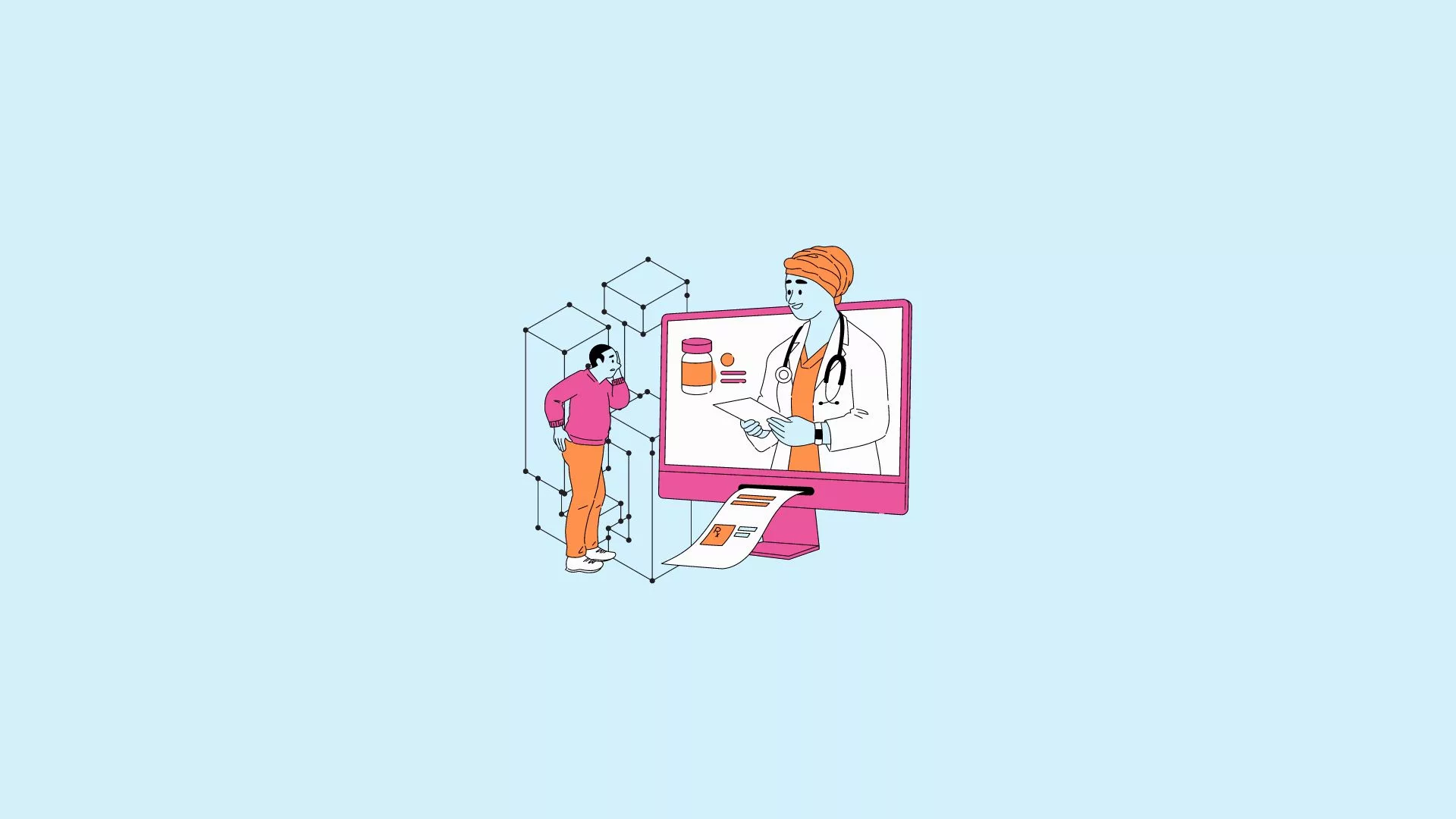





Leave a Reply